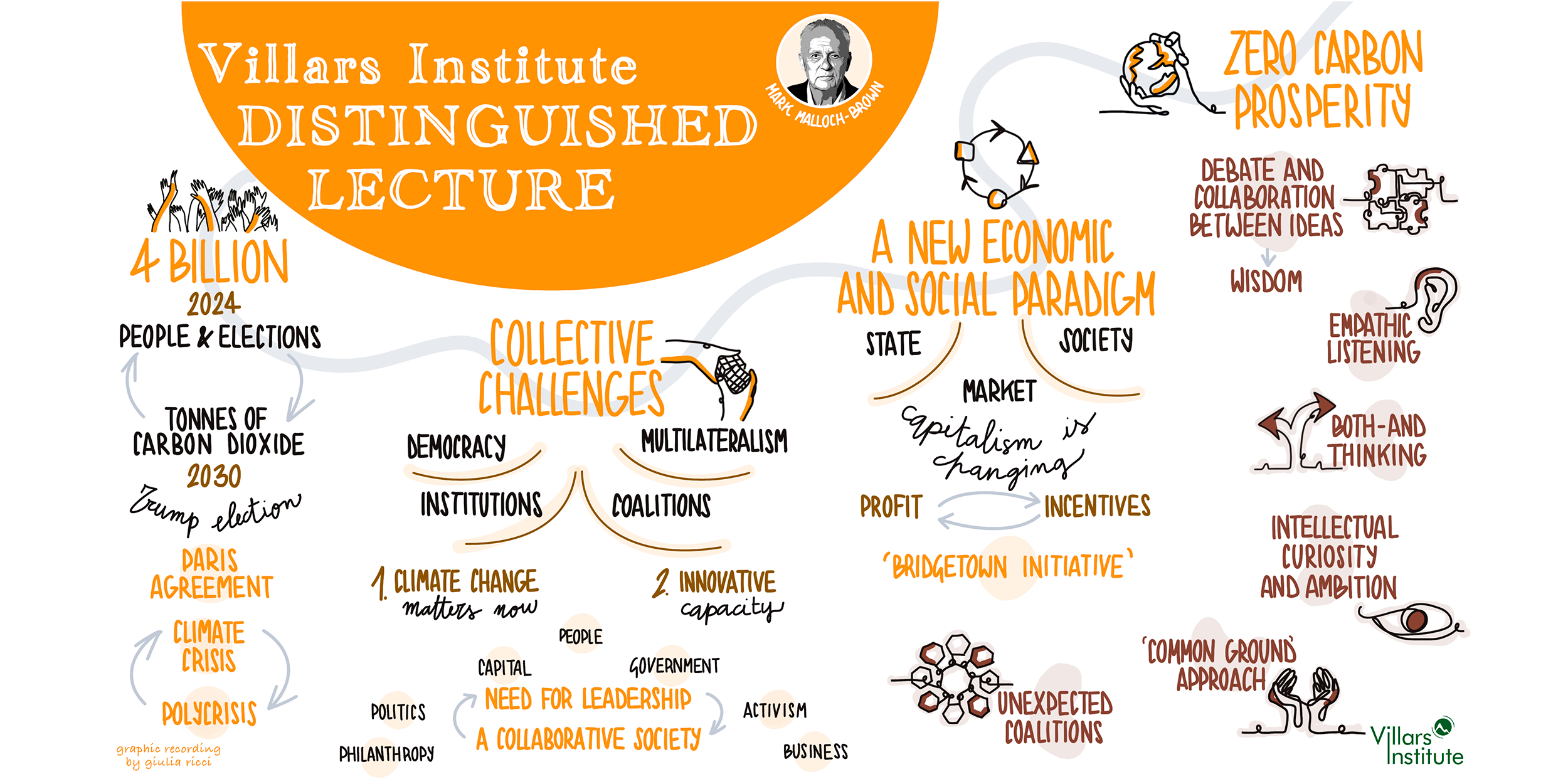Mark Malloch‐Brown is the president of the Open Society Foundations and has advanced sustainable development, human rights, and justice for more than four decades. He began his career as a journalist at the Economist and as an international refugee worker. This was followed by a distinguished career in international affairs that included serving as UN deputy secretary‐general and chief of staff under Kofi Annan and as administrator of the United Nations Development Programme (UNDP), where he led the creation of the Millennium Development Goals. Malloch-Brown was knighted for his contribution to international affairs and is currently on leave from the British House of Lords.
The following is the rapporteur report of the 3rd Villars Institute Distinguished Lecture given by Mark Malloch-Brown, exploring the geopolitical and multilateral pathways to accelerate the transition to a Net Zero and Nature Positive economy. The authors are Villars Fellows, currently high school students, researching systems leadership.
The Ideas
The lecture began with a number: 4 billion. It is the combined population in the states holding elections in one form or another this year. It is also, the number of additional tons of carbon that will be emitted if Trump wins the U.S. elections. Therefore, the beginning of the lecture focused on discussing how democracy is facing the climate issue. At the center, is the question of whether democracy will rise to the challenge of achieving net zero in time. The expert drew from the examples of the agricultural and farming protests, that form the backdrop of the European elections, to emphasize the link between the climate crisis and politics that is often overlooked.
On the issues of fossil fuels, the rather late realization at the COP28 conference of the need to replace fossil fuels was highlighted. The expert critiqued the current pace of international climate negotiations, arguing for more immediate and decisive action to counteract the slow and often contentious global response to environmental crises.
The complexities of aligning international efforts towards a cohesive climate strategy were also discussed. Policy makers should not be hindered or scared of waiting until all nations fully agree to the policy. The dogma of “don't let the good be destroyed by the perfect” resonated with participants. The fact that civil society should be more engaged in discussions, and that we should be “putting our democracy back in touch with our people” was also brought forward. The expert really pushed for changes inside of political institutions, especially regarding their leaders. To do this, the expert highlighted the importance of our institutions. The UN became a global force for humanitarian action and how key it is to have the right institutions, and institutional innovations, was accentuated. The expert asserted how he sees now as the time to make an economic security council a reality and how the Brazils and South Africas of the world should kick this off with the support of the Western democracies. This should be expanded to include smaller European countries who bolster international interdependence.
Lastly, the need for increased state-led investment in green technologies and infrastructure was highlighted, referencing the economic success of lithium battery factories as a case where environmental and economic objectives have been successfully aligned, leaving participants with a feeling of hope.
All of these ideas for the future, however, require future generations. The final focus of the distinguished lecture was on the importance of today’s young people. The significance of engaging with young people and of not just institutions, but individuals’ heterodoxy was spotlighted. Intellectual curiosity, ambition, deep empathy and above all, a desire for partnership matter.
The Perspectives
Participants engaged with the topic by raising questions about the role of international organizations, like the UN, in facilitating the transition to a Net Zero economy. Skepticism was expressed about the potential, or rather lack of potential for significant structural change within such institutions, given the existing political power dynamics.
Comments from the group emphasized the necessity of broadening discussions on macroeconomic and trade policies to include more diverse voices. There was a shared recognition of the need for inclusive decision-making processes that account for the interests of both developed and developing nations.
Moreover, there were remarks more personally connected to the expert, asking about things he would have known at the beginning of his career, looking back on it now. The expert responded by saying the post-cold war phase should have been used more efficiently. Relations and discussions with both China and Russia should have been kept more frequent and more open, in order to allow for more multilateral discussions, states holding each other accountable and a more internationally focused approach.
The lecture concluded on a note of cautious optimism. The expert highlighted the indispensable role of multilateral cooperation and innovation in driving the transition towards a Net Zero and Nature Positive economy. The convergence of geopolitical interests and environmental imperatives was stressed as a critical factor for forging a sustainable and equitable global future.



